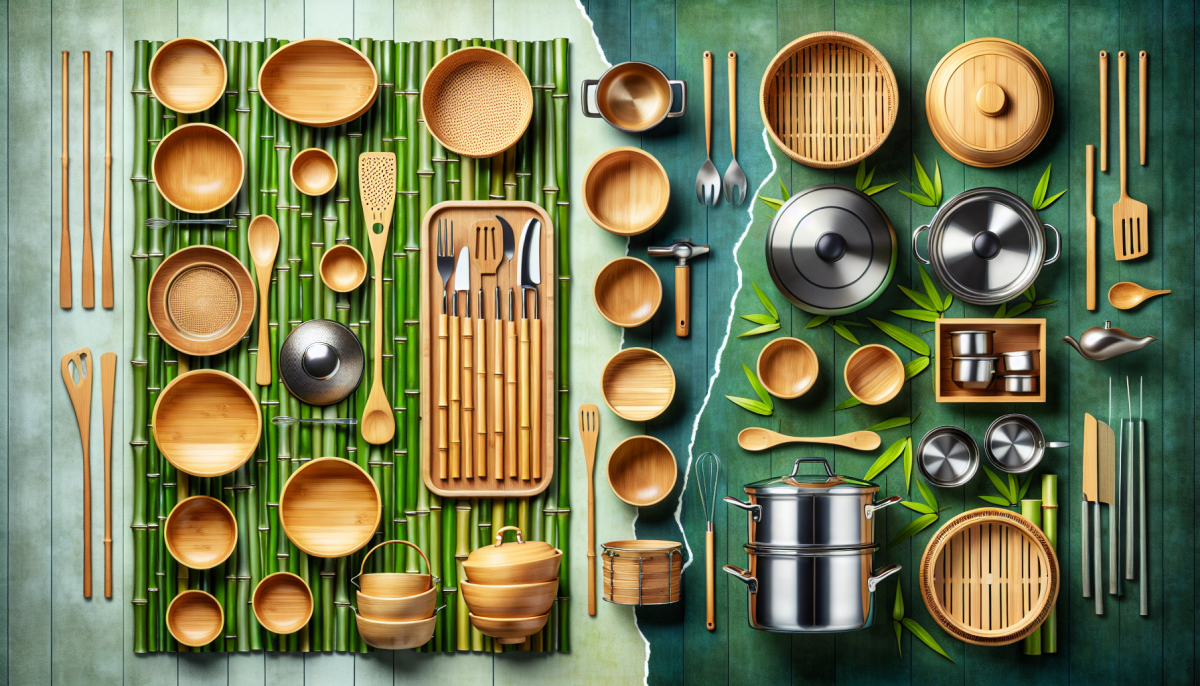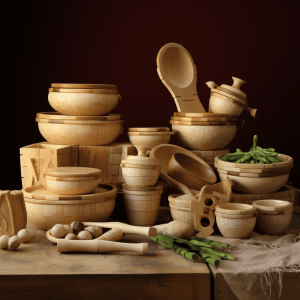When it comes to choosing the right cookware for your kitchen, the options seem endless. Traditional metal cookware has long been the go-to choice for home cooks and professional chefs alike. However, in recent years, a new contender has emerged: bamboo cookware. With its eco-friendly properties, durability, and stylish appearance, bamboo cookware has made a significant impact in the culinary world.
One of the primary reasons for bamboo cookware's rise to fame is its sustainability. Bamboo is a fast-growing grass that requires minimal water and no pesticides to flourish. Unlike metal cookware, which is often manufactured using energy-intensive processes and finite resources, bamboo cookware is considered a renewable and highly sustainable alternative. Choosing bamboo over metal cookware is a conscious decision that reduces environmental impact and supports a greener future.
Aside from its eco-friendly appeal, bamboo cookware has numerous practical advantages. It is lightweight yet incredibly strong, providing a durable option for everyday cooking needs. Bamboo also possesses natural antimicrobial properties, making it a hygienic choice for food preparation. Furthermore, bamboo's natural non-stick surface eliminates the need for excessive oil or butter in cooking, promoting healthier meals. Its natural beauty and versatility in design also allow for elegant serving directly from the kitchen to the table.
In the Heat of the Kitchen: How Metal Cookware Stacks Up
When it comes to choosing the right cookware for your kitchen, you may find yourself debating between bamboo and metal options. While bamboo cookware has gained popularity for its eco-friendly and natural properties, metal cookware remains a trusted choice for professional and home cooks alike. Let's take a closer look at how metal cookware stacks up against bamboo.
One of the primary benefits of metal cookware is its exceptional heat conductivity. Metals such as stainless steel, cast iron, and copper excel at distributing heat evenly, resulting in more consistent cooking. This allows your food to cook more quickly and evenly, reducing the risk of burning or unevenly cooked dishes. Metal cookware is also highly durable and can withstand high temperatures without warping or deforming. Additionally, metals are non-absorbent, making them resistant to stains, odors, and bacteria, unlike bamboo which may absorb liquids.
Another advantage of metal cookware is its versatility. The wide range of metal options available means you can find the perfect cookware for any culinary task. Stainless steel pans are ideal for sautéing and searing, cast iron pans are great for frying and baking, and copper pans are excellent for delicate temperature-sensitive dishes. Furthermore, metal cookware is compatible with all types of heat sources, including gas, electric, and induction stoves, providing you with greater flexibility in the kitchen.
The Battle of Durability: Bamboo vs Metal Cookware
Cooking utensils are essential tools in any kitchen, and choosing the right material for your cookware can greatly impact your culinary experience. Two popular options that often spark debate among chefs and home cooks are bamboo and metal cookware. Each material has its unique set of advantages and disadvantages, with durability being a critical factor to consider. In this article, we will delve into the battle of durability between bamboo and metal cookware, comparing their strengths and weaknesses to help uncover the ultimate choice for your kitchen.
Durability of Bamboo Cookware
Bamboo cookware has gained popularity in recent years due to its eco-friendly nature and charming aesthetic. However, when it comes to durability, bamboo cookware may present some limitations. Bamboo is a natural material that is highly susceptible to moisture, heat, and constant wear. This makes bamboo cookware prone to cracking, warping, and splintering over time. To enhance the durability of bamboo utensils, it is essential to properly maintain them by handwashing, keeping them dry, and applying food-safe oil regularly.
Durability of Metal Cookware
Metal cookware, on the other hand, is known for its robustness and long-lasting performance. Stainless steel, cast iron, and aluminum are popular metals used in cookware manufacturing. Stainless steel cookware is highly durable, resistant to rust, and does not react with acidic or alkaline foods. Cast iron cookware, while prone to rust if not properly cared for, is incredibly durable and can last for generations with regular seasoning. Aluminum cookware, while lightweight and affordable, may be less durable over time due to its propensity to dent and scratch.
Choosing the Ultimate Durability
Ultimately, the choice between bamboo and metal cookware boils down to personal preferences and priorities. If durability is your primary concern, metal cookware, especially stainless steel and cast iron, may be the better option. However, if you value sustainability, an eco-friendly choice, and are willing to take additional care to maintain your utensils, bamboo cookware can still provide satisfactory durability for everyday use. Regardless of your choice, proper care, and maintenance are crucial in ensuring the longevity and performance of your cookware.
Beyond the Kitchen: Exploring Health and Sustainability Factors
When it comes to choosing cookware for our kitchens, we often prioritize factors such as durability, heat conductivity, and ease of cleaning. However, in recent years, there has been a growing interest in exploring the health and sustainability aspects of the materials used in cookware. In this article, we delve into a comparison between bamboo and metal cookware, uncovering the ultimate choice for the conscious cook.
Firstly, let's consider the health implications of choosing bamboo or metal cookware. Bamboo, a renewable resource, is a popular eco-friendly option as it is non-toxic and chemical-free. It does not leach harmful substances into the food during the cooking process, making it a safe choice for health-conscious individuals. On the other hand, metal cookware, although commonly used, can potentially release toxic substances when exposed to high heat or acidic ingredients. This can pose health risks if consumed regularly. Therefore, for those prioritizing their well-being, bamboo may have an edge.
Additionally, sustainability is a key factor to consider in the age of climate change. Bamboo cookware wins in this category as well. Bamboo is a highly sustainable material due to its rapid growth and ability to regenerate quickly. It also requires fewer resources and energy during the manufacturing process compared to metal cookware. Moreover, bamboo is biodegradable, ensuring it does not contribute to landfill waste when disposed of. In comparison, metal cookware production produces greenhouse gas emissions and requires extensive mining, often leading to resource depletion and environmental damage.
Bamboo Cookware
Sustainable and Stylish Cookware to Elevate Your Kitchen Experience
Product information
Product Review Score
4.38 out of 5 stars
126 reviews


